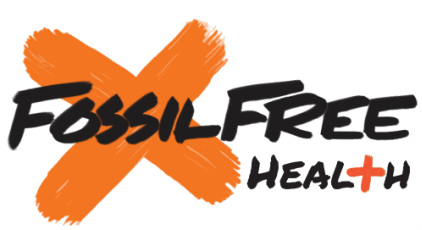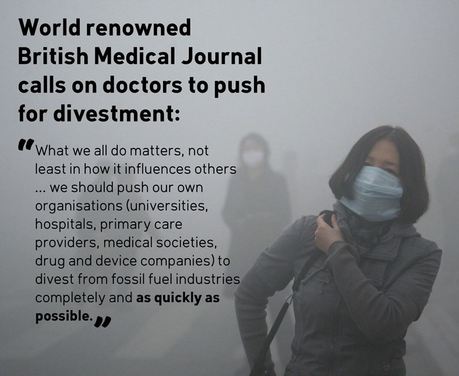Climate change and health: why does it matter?
Climate change has been called 'the greatest threat to global health of the 21st Century'. It threatens access to food, water and clean air, as well as economic and social stability, It will affect those least responsible first and most severely, but is also a major threat to health here in the UK and in other developed countries. Health bodies around the world have sought to highlight this through countless statements and calls to action. But this has not yet translated into meaningful political leadership for a healthier future.
Like many other UK-based individuals and organisations, including Medact (who are also working on the Fossil Free Health campaign) and the Climate and Health Council, as young people interested in the future of health we believe that now is the right time for the UK's major health institutions to take a stronger leadership role on this issue. We believe that health-focused organisations such as the British Medical Association and the medical and nursing Royal Colleges should remove their investments from an industry whose very business model threatens the systems which support both human and planetary health.
Fossil fuel divestment will send an important message that tackling climate change requires a drastic reduction of greenhouse gas emissions on an urgent timescale. If done in the right way, such changes can also bring enormous benefits to human health and well-being both in the short term and in the years and decades to come.
Climate change is already happening, and a rapid fall in emissions is required to prevent severe impacts on health. We know from the science that we cannot burn over one fifth of the world’s remaining fossil fuels if we wish to avoid surpassing 2 degrees’ rise. As scientists have shown, such a rise would be extremely dangerous for human health, especially that of the world's poorest - who have contributed least to the problem.
Like many other UK-based individuals and organisations, including Medact (who are also working on the Fossil Free Health campaign) and the Climate and Health Council, as young people interested in the future of health we believe that now is the right time for the UK's major health institutions to take a stronger leadership role on this issue. We believe that health-focused organisations such as the British Medical Association and the medical and nursing Royal Colleges should remove their investments from an industry whose very business model threatens the systems which support both human and planetary health.
Fossil fuel divestment will send an important message that tackling climate change requires a drastic reduction of greenhouse gas emissions on an urgent timescale. If done in the right way, such changes can also bring enormous benefits to human health and well-being both in the short term and in the years and decades to come.
Climate change is already happening, and a rapid fall in emissions is required to prevent severe impacts on health. We know from the science that we cannot burn over one fifth of the world’s remaining fossil fuels if we wish to avoid surpassing 2 degrees’ rise. As scientists have shown, such a rise would be extremely dangerous for human health, especially that of the world's poorest - who have contributed least to the problem.
What is divestment?
|
Divestment is the opposite of investment. The basic idea of divestment is simple: health institutions have significant financial investments in the fossil fuel industry and we are asking them to move their money elsewhere.
Divestment is a campaigning tactic that has been used in many high-profile progressive campaigns over the last 30 years. The apartheid divestment campaign of the 1980s – a broad coalition of churches, universities and councils – is credited as a major factor in the collapse of the apartheid government in South Africa. There is now a fast-growing and international fossil fuel divestment movement. Universities, churches, local government and others are all being challenged to remove their fossil fuel investments. A very small number of publicly-traded companies hold the vast majority of listed coal, oil and gas reserves. These are the companies we’re asking the health community to divest from. |
|
|
This campaign already has broad-based supported from both health professionals, students, and those at the heart of the health community. For example, Dr Fiona Godlee, Editor-in-Chief of the BMJ and Professor Sabaratnam Arulkumaran, the President of the British Medical Association, have both voiced their support for divestment from fossil fuels in this recent editorial.
Many other major health organisations have made similar statements about the importance of leadership on climate change, for example: “There is a key role for the [Wellcome] Trust to play in engaging with the public on issues relating to health impacts of climate change… If the [Wellcome] Trust is to become more involved in issues related to climate change, it will be important to lead by example.” - The Wellcome Trust, 'Health Consequences of Climate Change' |
Get involved!
There are plenty of ways to get involved in this campaign, and we're looking for passionate and committed people to join us. Over the next year, we’ll be working hard to make sure the major health institutions commit to divest from fossil fuels and we need all the help we can get to make this happen. In particular, we’re looking for people with experience of research, writing, communications, public speaking, direct action, visual design, film/animation, and education/training.
There are plenty of ways to get involved in this campaign, and we're looking for passionate and committed people to join us. Over the next year, we’ll be working hard to make sure the major health institutions commit to divest from fossil fuels and we need all the help we can get to make this happen. In particular, we’re looking for people with experience of research, writing, communications, public speaking, direct action, visual design, film/animation, and education/training.
*********If you’d like to get involved, fill in this form, and we’ll be in touch **********


